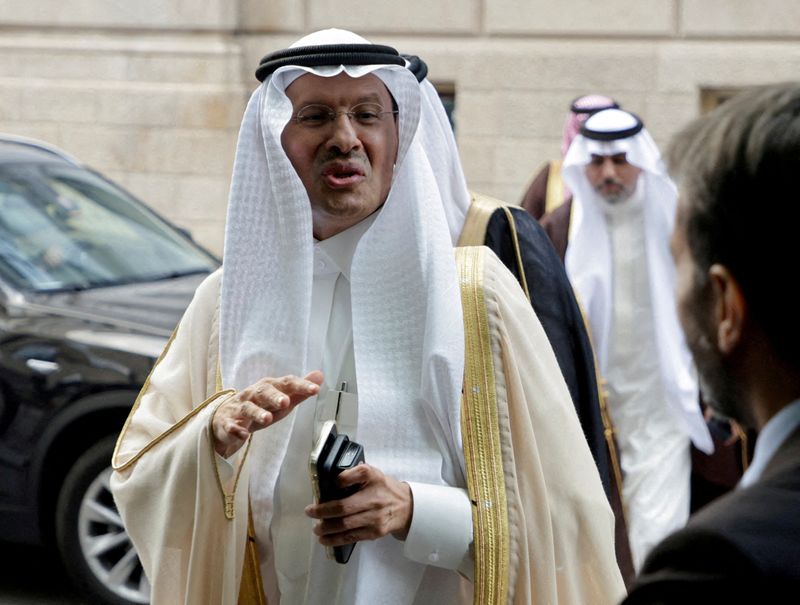By Ahmad Ghaddar
LONDON (Reuters) -Saudi Arabia's Energy Minister Prince Abdulaziz bin Salman earlier this month outlined one of the biggest reforms at OPEC in recent years and presented it as a reward for countries that invest in their oil industry.
The change clears the way for giving larger production quotas to OPEC Gulf members such as Saudi Arabia, the United Arab Emirates and Kuwait at the expense of African nations such as Nigeria and Angola.
Production quotas and baselines, from which production cuts are calculated, have been a sensitive subject within OPEC for decades as most producers want a higher quota so they can earn more from oil exports.
The shake-up is likely to become more extreme in the next few years as Middle Eastern state oil majors ramp up investments while production falls in African nations that have struggled to attract foreign investment.
Gulf producers, the holders of the little spare capacity in the global oil market, have long dominated OPEC.
Their power and influence has already increased in the last 15 years with their rising capacity, while African production has fallen as foreign investments have shrunk.
Unlike Gulf producers, African producers rely heavily on investment from international oil companies. Those companies have shunned Africa in recent years in favour of investment in the U.S. shale patch and in prolific giant oilfields elsewhere such as offshore Brazil and Guyana.
In May, Saudi Arabia, the UAE and Kuwait's share of total OPEC production was over 10% higher than it was 15 years ago at 55%, according to OPEC production figures. Nigeria and Angola's total share over the same period has shrunk by over 3% to below 9%.
For Nigeria, "capacity continues to be restricted by operational and security issues, combined with low investment levels, leading to decline," analysts at consultancy Wood Mackenzie said.
New field developments and recent discoveries in Angola will not be enough to stem long term capacity declines, they added.
In contrast, Saudi Arabia and the United Arab Emirates have plans in place to significantly boost their production capacity to 13 million bpd and 5 million bpd, respectively, by 2027 from current levels of about 12 and 4 million.
Fellow Gulf producer Kuwait on June 18 said it would boost its production capacity by 200,000 bpd by 2025 to reach 3 million bpd.
Capacity additions from the three Gulf countries over the 2020-2025 period total a combined 1.2 million bpd, double the capacity that Nigeria and Angola are projected to lose over the same period, Reuters calculations find.
The two West African countries have lost nearly a quarter of their production capacity since 2019 as a result of underinvestment and security issues.
QUOTA OVERHAUL
At its June 4 meeting, the Organization of the Petroleum Exporting Countries and allies, led by Russia, (OPEC+) overhauled production quotas for the majority of its members.
"In the final analysis what this agreement will achieve for all of us is that those who invest, not this year, but the years to come, '24 and '25 and moving forward, there will be a recognition for their investment," Prince Abdulaziz said.
One OPEC+ source, speaking on condition of anonymity, told Reuters the overhaul was needed to create a fairer system that better reflects the reality of member countries' production capacity.
While the majority of members of OPEC+ got a lower production target, the UAE's was higher.

Richard Bronze, Head of Geopolitics at Energy Aspects, said one of the reasons behind the change was to address OPEC's previous credibility issues when policy changes were not necessarily reflected on oil markets.
"It meant that the actual supply increase or decrease resulting for a quota change would be far smaller than the announced figure, fuelling doubts in the market about the ability of the group to manage market fundamentals," he said.